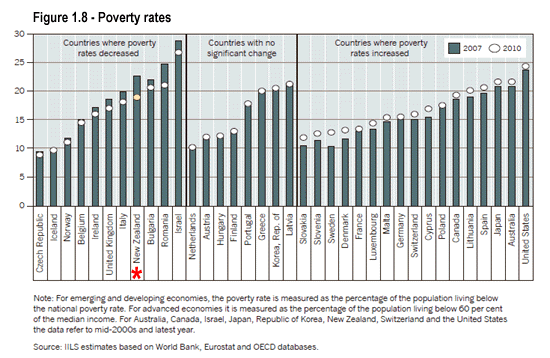
Here's my Top 10 links from around the Internet at 10:00 am today in association with NZ Mint.
Bernard Hickey will be back on tomorrow. (pheww!)
We welcome your additions in the comments below or via email to bernard.hickey@interest.co.nz.
Thank you for your patience and tolerance over the past five weeks. Normal service is about to be resumed.
See all previous Top 10s here.
1. Could General Motors be run by a woman?
GM may be grooming a senior female manager to take over as chief executive.
The current supremo has said she will be a candidate when he retires, and that he would like to appoint from within.
It would be an important signal if a woman was appointed to that top spot. More here »
Ms Barra, whose father worked for GM, first worked for the car maker as an 18-year-old student to help pay her tuition fees. The 50 year-old, who trained as an electrical engineer and has an MBA from Stanford University, is now tasked with overseeing and making more efficient the global design and production of GM's cars. She has estimated that the company wastes about $1 bln a year in the production and design process.
2. Money printing, Italian-style
While Europe’s financial overlords debate the wisdom of spurring growth by letting the European Central Bank print more money, some enterprising sorts northwest of Naples are taking matters into their own hands and printing reams of counterfeit euros. The NY Times is on to them:
“In Italy, there’s a great, ancient and august tradition: Here, they make fake money, done well,” said Col. Alessandro Gentili, the head of the Italian Carabinieri’s Currency Anti-Counterfeiting Unit in Rome. “Giugliano is still the capital. It has the best professionals.”
Quite a number of them, as it turns out. When the police rolled up some of the counterfeiting operations around Giugliano as well as in the Calabria region farther south in January 2009, they raided 162 locations and arrested 109 people, seizing a mountain of illicit materials.
Despite that raid, the biggest in years, Colonel Gentili says the counterfeiting continues, a tradition that — like winemaking, pottery, fabrics and other fine arts for which Italy is justly famous — is often passed from father to son.
3. 'We need 50 million more jobs'
The world needs to create 50 million jobs to return to pre-crisis employment levels, according to the ILO's World of Work 2012 report, but fiscal austerity and tough labour market reforms threaten the scenario for a true jobs recovery. The ILO has an interesting perspective on relative poverty rates:

4. Performance pay
Because teachers unions have been so trenchant in opposing performance pay in their profession (that is: higher pay for superior performance), they are now facing frustration from policy makers which may well result in the inverse - lower pay for poor performance. Had they front-footed the issue, it seems doubtful the current direction would have gained traction. Hopefully teachers here will learn from a developing British situation:
MPs claim the reforms would address fears that poor teachers are having a “very significant” impact on children’s long-term career prospects. The report quotes international research which shows that the worst teachers could cost a class of 20 the equivalent of £250,000 in lost earnings over their career.
Eric Hanushek, an economist at Stanford University in America, has shown that an excellent teacher can cover a year and a half’s material in a single year, whereas a poor one will get only a third as far.
Teaching unions are strongly opposed to any attempt to alter national pay and conditions. However, the committee’s report says: “No longer should the weakest teachers be able to hide behind a rigid and unfair pay structure.
5. 'Europe to the brink again'
Larry Summers, the former US Treasury Secretary, and former Harvard boss, explains why austerity is not the answer to Europe's debt problems.
Skeptics will rightly wonder how a prescription for more spending by countries that already have trouble borrowing can be correct. The answer lies in the difference between borrowing by individuals and countries. Normally, an individual helps his creditors by borrowing less; but a person who stops borrowing to finance commuting to his job does his creditors no favor. A country’s income is determined by spending, so a country that pursues austerity to the point where its economy is driven into a downward spiral does its creditors no favor. Yes, there will ultimately be a need to raise retirement ages, reform sclerosis-inducing regulations and restructure benefit programs; phased-in commitments in these areas would be constructive. But the prospect for political and economic success in these endeavors depends on growth being restored.

6. Rising since February
We hear a lot about the "Baltic Dry Index" when it is falling - confirmation for gloomsters that the end is near. But its not in the news at present so we thought we would check its recent trends. It's on a steady rise, and you can see it here: draw your own conclusions about what it 'predicts'.
7. Hogan's tax war over
The Australian Tax Office has ended its pursuit of actor Paul Hogan. They've been after him for more than ten years. In the settle-up, he didn't have to admit guilt and is now free to travel. The ATO was after "unpaid taxes" of A$150 mln. although this included interest and penalties. Apparently the claim was for undeclared income from the movies he directed/produced, especially the "Crocodile Dundee" series. He has always maintained he has done nothing wrong.
8. Change at the top
The outgoing head of the Bank of England is taking even more criticism that usual. Some have even called his tenure a "disaster". Dr Bollard is leaving the RBNZ soon as well, but he must be relieved no-one is on his case as they are in the UK.
Mr Cumming did not expand on his position, but City figures are known to be frustrated with the Governor’s apparently conflicting demands for lenders to boost their capital buffers and increase lending at the same time. Furthermore, they find his sermons about bankings' ills grating given his regulatory failings before the crisis.
“He was happy to let them run at 150 miles an hour. Now he wants them running at 10 miles an hour and armour plated,” said one senior City figure. “He’s gone from very light touch to excessive regulation. That’s making it difficult for banks to lend, which is bad for them and the economy.”
9. The death of Facts
A columnist at the Chicago Tribune has lamented the death of 'facts' and written an obituary. He notes that Facts is survived by two brothers, Rumor and Innuendo, and a sister, Emphatic Assertion.
Through the 19th and 20th centuries, Facts reached adulthood as the world underwent a shift toward proving things true through the principles of physics and mathematical modeling. There was respect for scientists as arbiters of the truth, and Facts itself reached the peak of its power.
But those halcyon days would not last.
People unable to understand how science works began to question Facts. And at the same time there was a rise in political partisanship and a growth in the number of media outlets that would disseminate information, rarely relying on feedback from Facts.
"There was an erosion of any kind of collective sense of what's true or how you would go about verifying any truth claims," Poovey said. "Opinion has become the new truth. And many people who already have opinions see in the 'news' an affirmation of the opinion they already had, and that confirms their opinion as fact."
And then there is the "backfire effect" - NPR has that story.
10. The last laugh
Lets finish my stint with the cast from The Simpsons.
23 Comments
For a former Treasury official and Harvard President, Larry Summers's aticle is so full of BS that he should officially be named "stupid says as stupid is "....
1. A country’s income is determined by spending, WRONG !!!
A country's income is determined by it's populace's productivity. !!
2. a person who stops borrowing to finance commuting to his job does his creditors no favor.
WRONG !! There is no need for a person to borrow to finance his commuting to work. He should be able to finance his commuting from his wages. If he is not able to it means his expenses is too high compared to his pay.....
The problem in Developed countries is not just excessive spending by goverments and households, but also labour and structural obstacles to productivity growth...(eg Auckland Ports ). This seems small and unimportant if there has been no globalisation, but with China's industralisation, and India's, and Africa's soon to be industrial takeoff.....
Yesterday I attended a most genteel demonstration. I was in good company, with the NSW Country Woman's association being in on the demonstration. The first time in their 90 year history.
The Farmers in NSW are not happy with Coal Seam Gas (CSG) mining. And not happy with the NSW State government.... Which should be sympathetic to the farmers. Farmers are very unhappy with the impact to the water table of the water extraction required to enable CSG extraction.
My guess is the average age at the demo was about 50. With some 80+ year olds there. Got a couple of shots of a couple that appeared to be well over 80.
Had to giggle at the coppers who were there as security. Most of them looked like the protestors children or grandchildren.
As the NSW Country Women's Association president said. They were not just about tea and scones yesterday
GBH believes Natural gas is the answer to peak oil...
Wonder whether there might be one or two roadblocks to it along the way.
(P.S. The only reason I went is a docmentary maker i know who goes to every demonstration he can invited me along so we could meet up and have a coffee afterwards. He goes to every demo he can as he is an interested observer of the human condition and, for example, has gone to pro-gun and anti-gun rallies....)
Yup , I saw that on the telly ........ the screeching luddites were in fine form ......
....... but you do me wrong , Gummy refutes " peak oil " as a concept ....
My take on Nat-Gas is that it is now 85 % cheaper than it was pre-GFC , whereas oil is only 30 % cheaper than it's peak ...... simple economics really , natural gas represents an incredibly cheap energy source , compared to oil ......... and it's a cleaner burning product , too ..
re9 - quite correct, and followers (I use the term purposely) of the likes of Bjorn Lomborg should have a good, long, hard, introspective 'think'.
re6 - "only to reach its all-time high of 11,440 points in June 2008".
(all things are relative, eh?)
re4 - no teacher stays in it for the money. The nonsense is that evaluation wouldn't be of the teacher, but of the results of the pupils. The accuracy of the cannon depends on the quality of the cannon-fodder. And, of course, you have to educate them for the future, not the past.
Which sort of precludes free-market-will-solve-all preaching, and the aforementioned Bjorn whatsishandle.
It woud be good to see more physics taught, though. We'd end up with a better-informed Govt, media, populace.......
I see that the farcical National/Act govt BS regarding teaching is now spewing forth in a determined effort to make a complete stuffup once again.....How many times must these fools have their heads knocked together before the grey sludge inside starts to see the light?
The truth is, they are on this stupid pathway to enable the salary budget to be slashed...none of these idiots will be here to clean up the mess.
To say you can measure the quality of a teacher using examination results is of course an utter sham....one might as well measure the quality of nurses by asking patients to tick boxes....or for politicians, to ask people in the street to do the same....!
Remember Merv Wellington...thought you would....has anything changed....not inside the National Caucus it hasn't.
Yes it is clear they are just looking at budget slashing. They don't even see merit in their qualifications as chartered schools don't require trained teachers.
No worries mate their children all attend private schools so what the problem?
ps Shouldn't those parents be concerned private schools do not have to report on National standards..an't quite national standards then are they :-)
If you measured the "value-add' that a teacher achieved, and rewarded that, it might work.
Problem is assessment methology...plus that is not the agenda
Right on Wolly, a number of my retired colleagues only yesterday were ruminating on why they stayed teaching for so long. I wished I'd followed my earlier dreams of a career in architecture, or even farming. Mortgages and a young family put a stop to that.
I see PDK pretty much gets it too. I spent most of my teaching working with the disadvantaged, although I'm happy to say that with my exam classes I did get excellent results. Still that is not the basis for assessing pay. At a senior level your clients have all self selected and the "rest" have left school to brass off the community at large.
Larry Summers is talking absolute nonsense, and his lies are dangerous as gullible, economically illiterate people believe them. 'National income' isn't determined by spending; it's determined by production.
It's quite simple - for something to be consumed it has to first be produced (you can't consume something that doesn't exist), and in order to spend we must first produce something (good or service) to earn money, or borrow money (essentially borrowing someone else's production with the promise you will produce enough to pay it back with interest in future). Well, I suppose option C is to hold your hand out to the government to force other people to give you money.
Treating the economy as some giant accounting equation is extremely dishonest because all forms of spending ARE NOT equal; consumer spending, as the name suggests, consumes, while spending on capital goods (the things that make either consumer goods or other capital goods) enables production, and therefore the size of the economy, to increase.
Government spending is inherently consumptive, and contrary to what Mr Summers seems to believe, it does not come from some magic fountain but rather from wealth producers, whether through tax, inflation, borrowing or a combination of all three. These supposedly 'austere' governments are actually raising taxes!
Left-wingers seem to understand that taxing something more means less of it (hence the drive to tax cigarettes and alcohol and take GST off 'healthy' food), but can't seem to take the next step and apply that principle to the wider economy.
Cutting government spending won't cause money to magically disappear; it will simply change who has the money, and what it is spent on. There will obviously be an adjustment period for those who relied on the largesse of the state but I find it hard to feel sorry for people who have based their lifestyle on the forced generosity of others.
From the US pespective, Larry Summers is correct :
1. Print pieces of green paper and give them to china in exchange for stuff to consume.
2. Tell Chinese later "The Dollar is our currency but your problem ".....
Larry is sharp guy so the real story is why is he saying it :-)
This is really rather mesmerising:
http://www.australiandebtclock.com.au/
the US version has been around for some time but I hadnt seen this. Eye-popping!
It's all King's fault...nothing to do with the public spirited friendly UK banks...and as for blaming the bank bosses and boards...dear oh dear....they deserve their bloated bonuses and fat pay packs....next we will be told they are just sociopathic and driven to succeed regardless of how many people they crush beneath their piles of cash. Shee yits the lot of them.
Well said.
Re Item 4
New Zealand schooling ranks in the top 5 in the world, The UK is lucky to make it in the top 25.
We have very little to learn from the UK when it comes to most things and especially education.
Performance pay for Teachers becomes something that people end up chasing but it will get us know where because it simply leads to gaming, teaching to test rather than teaching the subject.
In the UK they recently had the farce of the examination boards selling seminars to teachers so they could find out in advance what the questions would be.
The UK has very little to teach us about education.
As a teacher with many years service in the primary sector and more recently in the secondary system I sympathise with the govt. as there is a fair bit of deadwood in the classrooms of of NZ. The down side of the current pay system is that we all get paid the same and while one might start out all starry eyed and enthusiastic it doesn't take long to get cynical.' Why work harder I'm going to get paid the same anyway?' Unfortunately the majority of teachers are merely adequate but not many of us push ourselves as there's no incentive.
I for one would work harder if I thought my efforts were recognised or rewarded.
Here's the thing Neili....how do you know your efforts are not recognised by the students and your colleagues!
Tuesday never comes
http://www.pimco.com/EN/Insights/Pages/Tuesday-Never-Comes.aspx
My point is Wolly that my colleagues or students may indeed recognise my efforts but I'm paid the same weather I work to the best of my ability or choose to cruise. There are 60 teachers in my school, about 10 of them are highly motivated and driven people who work themselves to the bone (grossly under paid). There are about 10 slack , lazy and ineffective teachers (grossly over paid) and the rest of us cruise along in a nice safe zone trying to be efficient with our energies,(reasonably paid).
Is this the best system we can come up with? Taxpayers getting best value? .. I don't think so.
But New Zealand as a whole actually does a very good job educating children. The international comparrisons show this. You may be beating yourself up a bit. However we can always strive to do better.
1. Hire well qualified people
2. Pay them well
3. Keep training them
To my mind as a mere parent , teaching is just to hard a job to take on if you are not really into it. But I could be wrong.
As a society and as individuals, our primary objective must be to raise our young people. What other point is there?
The ten have some values and intergrity. The problem is when the population is made up of people who do not give their best to what they do. The system comes down to people.... starting from poor mangement... down to limited values of people workinga as teachers that you site.
Would the pay REALY have that much to do with your motivation? I doubt it. I wonder why your fingers to the bone crowd (and you for that matter) aren't like the slackers-you're all getting paid the same. Studies show pay (past a certain amount, which you are now over) doen't really motivate people further. I suspect you've been ground down by other than pay considerations and probably need something besides money to regain your enthusiasm. But really, how hard SHOULD you be working? Isn't doing a good job good enough? Should you be at work all hours? I think that you are worried that you aren't shows you really do care. Teachers are allowed to have a life you know.



We welcome your comments below. If you are not already registered, please register to comment
Remember we welcome robust, respectful and insightful debate. We don't welcome abusive or defamatory comments and will de-register those repeatedly making such comments. Our current comment policy is here.